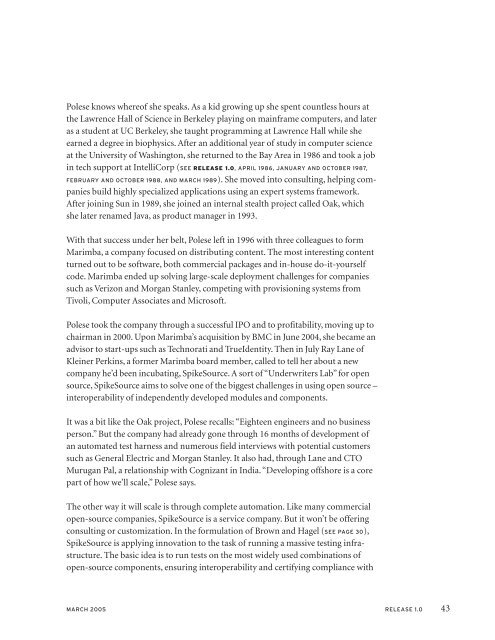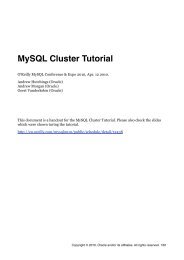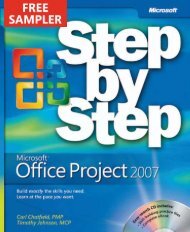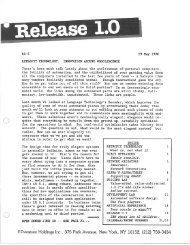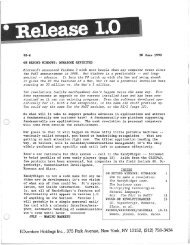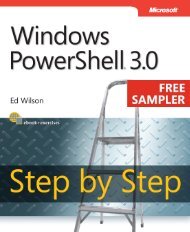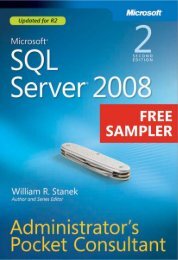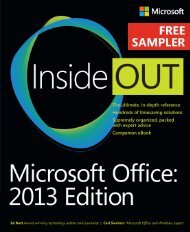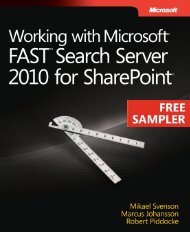The World Wide World: IT Ain't Just the Web ... - Cdn.oreilly.com
The World Wide World: IT Ain't Just the Web ... - Cdn.oreilly.com
The World Wide World: IT Ain't Just the Web ... - Cdn.oreilly.com
You also want an ePaper? Increase the reach of your titles
YUMPU automatically turns print PDFs into web optimized ePapers that Google loves.
Polese knows whereof she speaks. As a kid growing up she spent countless hours at<br />
<strong>the</strong> Lawrence Hall of Science in Berkeley playing on mainframe <strong>com</strong>puters, and later<br />
as a student at UC Berkeley, she taught programming at Lawrence Hall while she<br />
earned a degree in biophysics. After an additional year of study in <strong>com</strong>puter science<br />
at <strong>the</strong> University of Washington, she returned to <strong>the</strong> Bay Area in 1986 and took a job<br />
in tech support at IntelliCorp (SEE RELEASE 1.0, APRIL 1986, JANUARY AND OCTOBER 1987,<br />
FEBRUARY AND OCTOBER 1988, AND MARCH 1989). She moved into consulting, helping <strong>com</strong>panies<br />
build highly specialized applications using an expert systems framework.<br />
After joining Sun in 1989, she joined an internal stealth project called Oak, which<br />
she later renamed Java, as product manager in 1993.<br />
With that success under her belt, Polese left in 1996 with three colleagues to form<br />
Marimba, a <strong>com</strong>pany focused on distributing content. <strong>The</strong> most interesting content<br />
turned out to be software, both <strong>com</strong>mercial packages and in-house do-it-yourself<br />
code. Marimba ended up solving large-scale deployment challenges for <strong>com</strong>panies<br />
such as Verizon and Morgan Stanley, <strong>com</strong>peting with provisioning systems from<br />
Tivoli, Computer Associates and Microsoft.<br />
Polese took <strong>the</strong> <strong>com</strong>pany through a successful IPO and to profitability, moving up to<br />
chairman in 2000. Upon Marimba’s acquisition by BMC in June 2004, she became an<br />
advisor to start-ups such as Technorati and TrueIdentity. <strong>The</strong>n in July Ray Lane of<br />
Kleiner Perkins, a former Marimba board member, called to tell her about a new<br />
<strong>com</strong>pany he’d been incubating, SpikeSource. A sort of “Underwriters Lab” for open<br />
source, SpikeSource aims to solve one of <strong>the</strong> biggest challenges in using open source –<br />
interoperability of independently developed modules and <strong>com</strong>ponents.<br />
It was a bit like <strong>the</strong> Oak project, Polese recalls: “Eighteen engineers and no business<br />
person.” But <strong>the</strong> <strong>com</strong>pany had already gone through 16 months of development of<br />
an automated test harness and numerous field interviews with potential customers<br />
such as General Electric and Morgan Stanley. It also had, through Lane and CTO<br />
Murugan Pal, a relationship with Cognizant in India. “Developing offshore is a core<br />
part of how we’ll scale,” Polese says.<br />
<strong>The</strong> o<strong>the</strong>r way it will scale is through <strong>com</strong>plete automation. Like many <strong>com</strong>mercial<br />
open-source <strong>com</strong>panies, SpikeSource is a service <strong>com</strong>pany. But it won’t be offering<br />
consulting or customization. In <strong>the</strong> formulation of Brown and Hagel (SEE PAGE 30),<br />
SpikeSource is applying innovation to <strong>the</strong> task of running a massive testing infrastructure.<br />
<strong>The</strong> basic idea is to run tests on <strong>the</strong> most widely used <strong>com</strong>binations of<br />
open-source <strong>com</strong>ponents, ensuring interoperability and certifying <strong>com</strong>pliance with<br />
MARCH 2005 RELEASE 1.0 43


